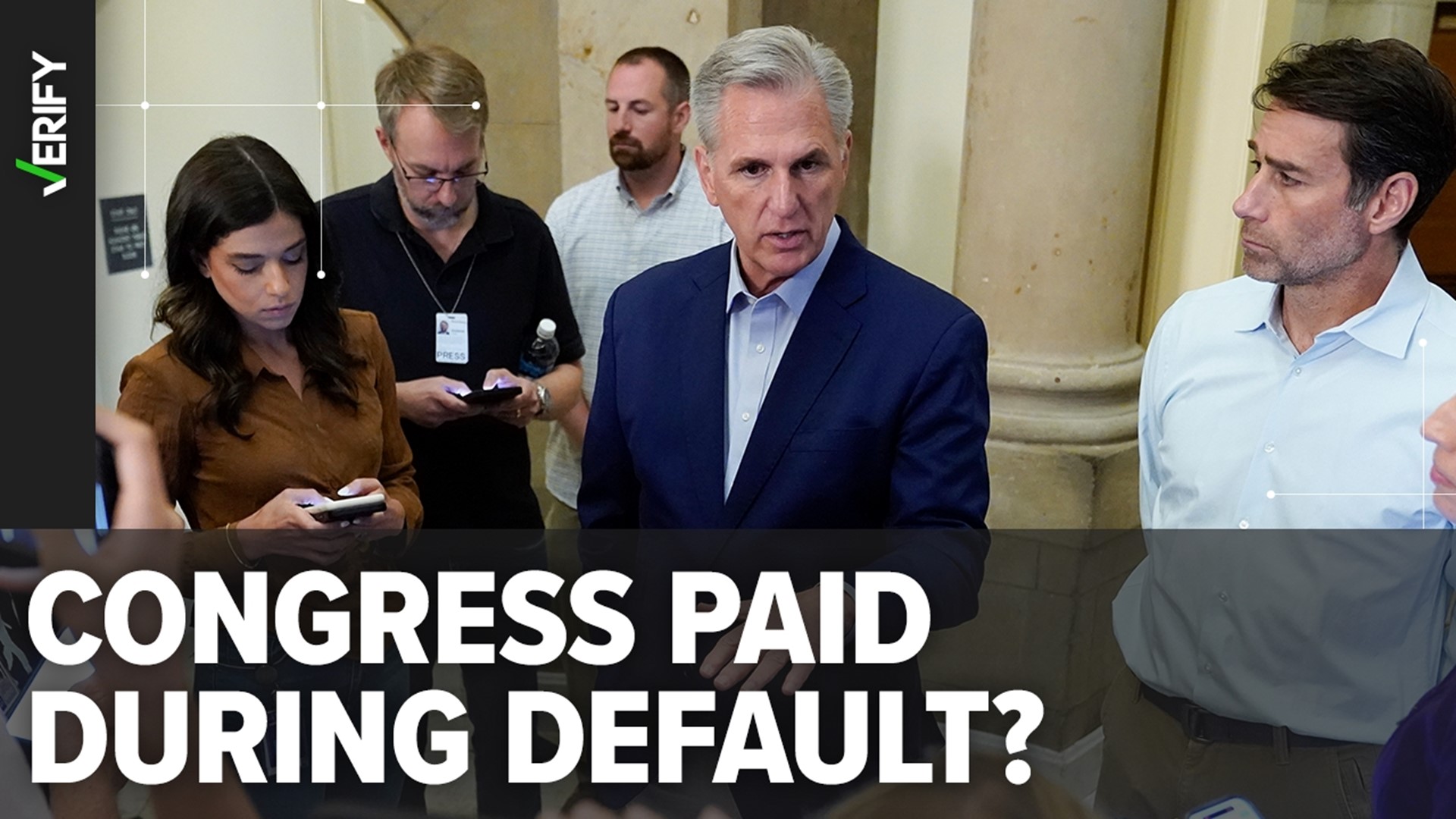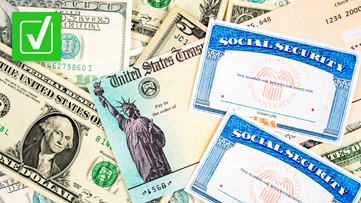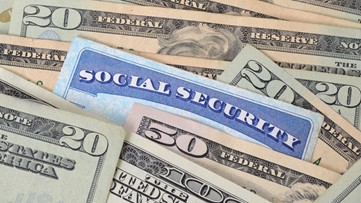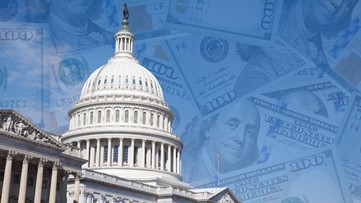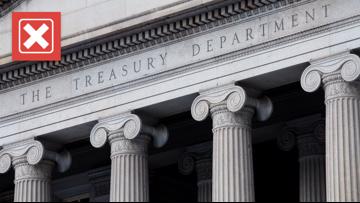President Joe Biden and House Republicans have not reached an agreement to raise the U.S. debt ceiling, despite months of warnings that the government could default on its financial obligations as soon as June 1.
Many VERIFY readers have reached out with questions amid the debt ceiling standoff, including whether the U.S. has defaulted on its debt before and how a potential default could impact monthly Social Security checks.
Here are VERIFIED answers to five key questions about the debt ceiling and a potential default.
THE SOURCES
- The Bipartisan Policy Center
- The Congressional Research Service (CRS)
- The Council of Economic Advisers (CEA), an agency within the Executive Office of the President
- Thomas Kahn, distinguished faculty fellow at American University’s Center for Congressional and Presidential Studies
- David Wessel, Director of the Hutchins Center on Fiscal and Monetary Policy at the Brookings Institution
- Kathleen Day, MBA, M.S., finance professor at the Johns Hopkins Carey School of Business and an author specializing in financial crises
- Jack Lew, U.S. Secretary of the Treasury 2013-2017, testimony before Senate Finance Committee
WHAT WE FOUND
QUESTION #1
Will a default raise borrowing costs and have other negative effects on the economy?
THE ANSWER
Financial experts, including Johns Hopkin finance professor Kathleen Day, warn that a default would have disastrous consequences for the U.S. economy.
It would “ruin our reputation” in the global economy and the cost of borrowing at home would rise “astronomically,” Day said. In addition, a default would likely cause the stock market to fall and potentially cost millions of jobs, she added.
In the past, there have been costs to nearing a default – even when one was avoided.
When the U.S. came within two days of a default in 2011, the nation’s credit rating was downgraded for the first time in U.S. history, according to Thomas Kahn, a distinguished faculty fellow at American University and former staff director of the House Budget Committee. A downgraded credit rating is a signal that investors have lost trust in the U.S. economy.
“The interest rates went up, the stock market dropped and the cost to taxpayers was over $1 billion,” he said.
QUESTION #2
Has the U.S. ever defaulted over failure to raise the debt ceiling?
THE ANSWER
The Council of Economic Advisers (CEA), an agency within the Executive Office of the President, said in a 2021 blog post that the U.S. “has never intentionally defaulted on its debt because of the debt limit.” Experts who spoke with VERIFY agree.
Though the U.S. has never defaulted over failure to raise the debt ceiling, the government has not had an “unblemished payment record” throughout its history, the CRS explained in a report.
There are several instances of potential default that economic experts have cited in the past, though they are not related to a debt ceiling standoff. You can read more about the history here.
QUESTION #3
Will Social Security and other benefit payments like SNAP be late or missing if the U.S. defaults?
THE ANSWER
If the Treasury cannot borrow money and exhausts its cash on hand, the government can only pay its bills using incoming revenue from things like taxes. But, given the government’s large annual deficit, spending typically exceeds revenue. In this situation, the government couldn’t make all of its payments on time or in full, the Bipartisan Policy Center explains.
Kahn and other experts, including the CEA, say a default would put monthly Social Security checks at risk of arriving late or not at all. Treasury Secretary Janet Yellen echoed these concerns during an event in late April 2023.
But there’s no definitive answer. That’s because there isn’t a precedent or legal framework that allows the Treasury to choose which bills it will pay.
“Hypothetically, if we were to default, it would put the government in an impossible Sophie’s choice because we would have to make choices between paying people who depend on Social Security, paying our men and women in uniform, or paying our bondholders,” Kahn told VERIFY.
Apart from Social Security checks, the federal government may have to miss or delay payments for Medicare and Medicaid beneficiaries, and people who receive Supplemental Nutrition Assistance Program (SNAP) benefits.
QUESTION #4
Will federal government workers and members of Congress be paid if the U.S. defaults?
THE ANSWER
Experts previously told VERIFY that the federal government may also have to miss or delay payments to federal government workers if the U.S. defaults. But the answer is unclear since there isn’t a precedent allowing the Treasury to pick and choose certain bills to pay.
The same goes for members of Congress – there’s no definitive answer on whether they would be paid in the event of a default.
Testifying before the Senate Finance Committee in 2013, amid a debt ceiling standoff during President Obama’s second term, then-Secretary of the Treasury Jack Lew told Congress it isn’t logistically possible to prioritize some bills over others.
“We write, roughly, 80 million checks a month. The systems are automated… because, for 224 years the policy of Congress and every President has been: we pay our bills,” he said. “You cannot go into those systems and easily make them pay some things and not other things. They were not designed that way, because it was never the policy of this government to be in the position that we would have to be in if we could not pay all our bills.”
That means in a default scenario, who gets paid may simply be up to chance. Which revenues happen to enter which accounts at which times will determine which automated payments will actually be able to be made.
QUESTION #5?
Is a default the same as a government shutdown?
THE ANSWER
A default and a government shutdown are “entirely separate events,” the Bipartisan Policy Center says.
A government shutdown occurs when Congress does not pass annual appropriations bills on time. Federal agencies “cannot spend or obligate any money without an appropriation, or other approval, from Congress,” David Wessel, an expert in fiscal and monetary policy with the Brookings Institution, explains.
If Congress fails to pass appropriations bills, federal agencies have to stop all non-essential functions. This is what’s known as a government shutdown.
During a default, the spending has already been approved by Congress and the government is therefore legally obligated to make those payments, but it cannot do so because it has run out of money.
QUESTION #6
Has the debt ceiling been increased under both Republican and Democratic presidents?
THE ANSWER
Congress has raised the debt ceiling many times over the years under the leadership of both Democrats and Republicans.
“Congresses with Democratic and Republican majorities have authorized these increases, both when their party controlled the White House and when it did not,” the Bipartisan Policy Center says.
Since the end of World War II, Congress has approved more than 100 separate changes to the debt ceiling, according to a November 2022 report from the Congressional Research Service (CRS). The debt ceiling has been raised 20 times since 2001.
“Increases in spending on old-age and retirement programs, lower tax receipts, and federal activities related to the Great Recession and in response to the COVID-19 pandemic have all contributed to rising debt levels,” the CRS wrote in its report.
Most recently, in December 2021, Congress passed legislation raising the debt ceiling by $2.5 trillion to its current limit of approximately $31.4 trillion.
